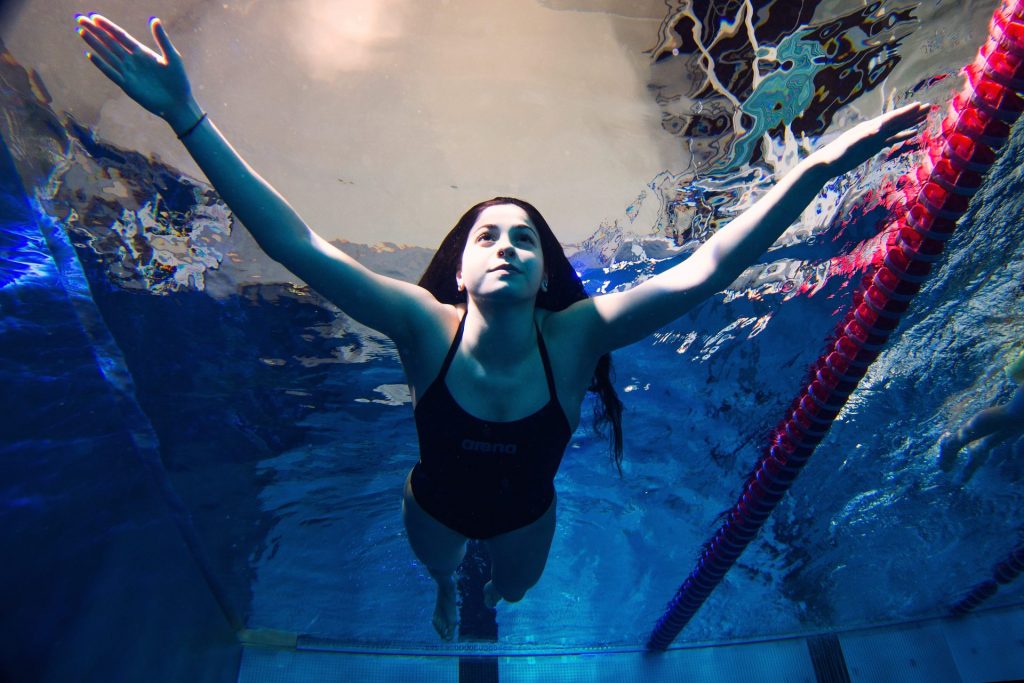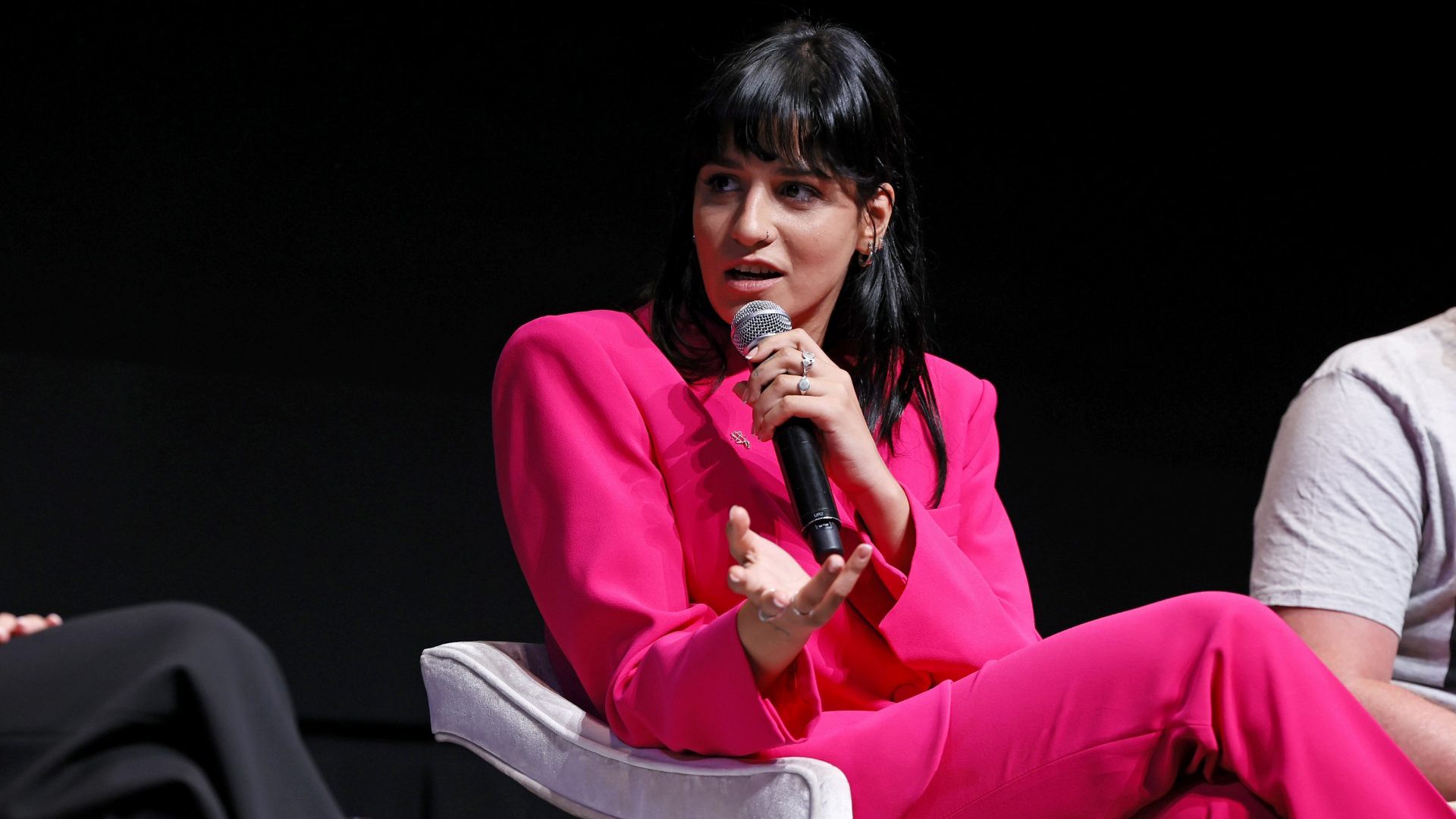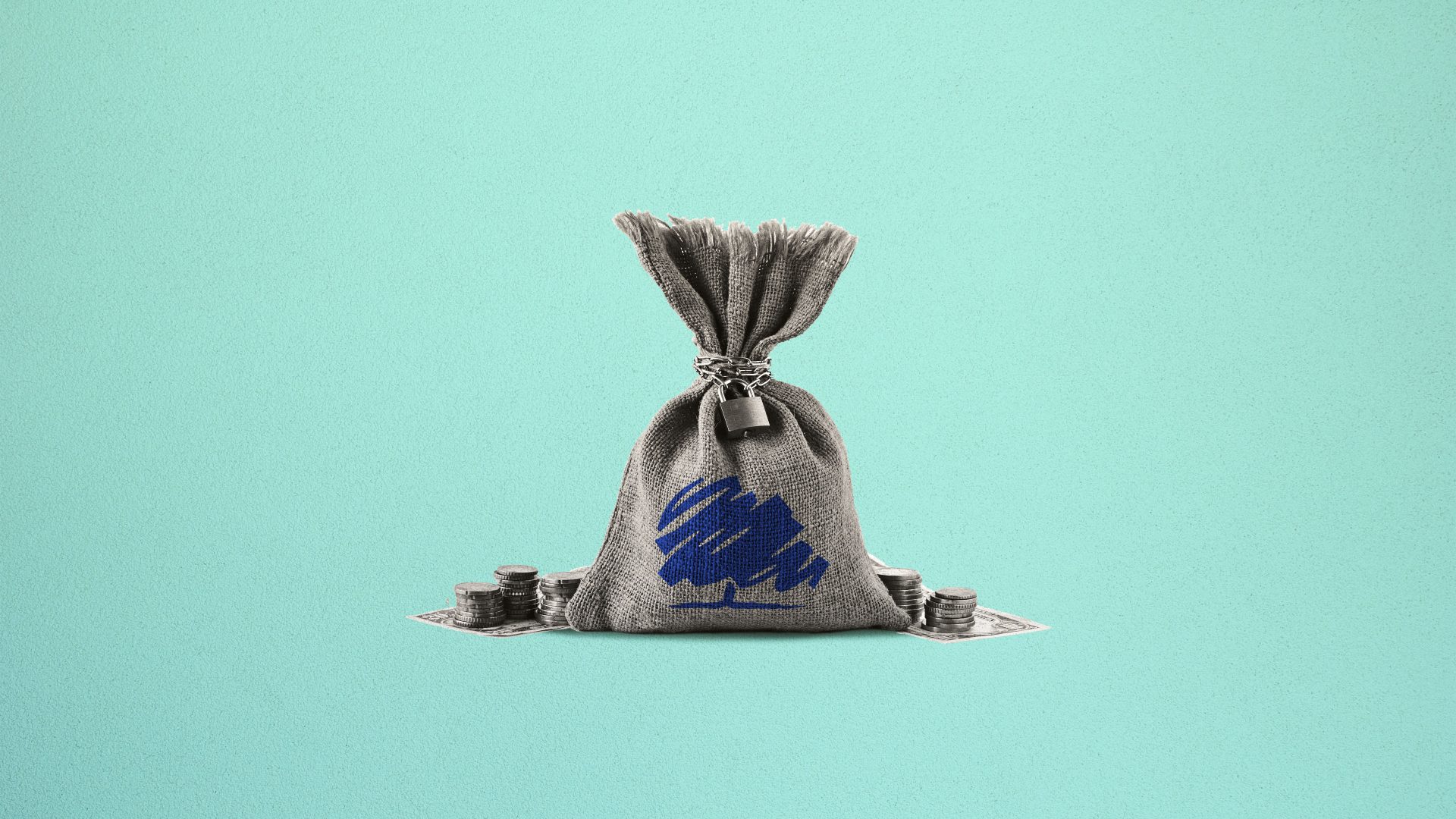As the dark waves of the Aegean threatened to engulf their overcrowded dinghy at night, Sara and Yusra Mardini jumped into the freezing waters, tied themselves to the boat, and swam. By morning, the Syrian refugee sisters had pulled the vessel, with its broken engine, on to a Greek beach, saving the lives of all 18 on board and earning international hero status.
Just as their 2015 journey fleeing the war in Syria for Germany captured the public imagination, so has a film about the sisters by Welsh-Egyptian director Sally El Hosaini, The Swimmers. Hailed by the New York Times as an “inspirational (but rarely sugarcoated) crowd-pleaser” and scoring 81% on the reviews aggregator website Rotten Tomatoes, it spent three weeks in Netflix’s global top 10 most-watched movies and has been in the top 10s of 88 different countries. By any standard, it’s a hit, one that ends (spoiler) with Yusra, 17 at the time of the fateful crossing, racing at the 2016 Rio Olympics. Since then she has written a memoir, become a UN goodwill ambassador and graced the pages of numerous publications.
But now the older Mardini sister is under a different spotlight. Eight years after she saved her fellow refugees’ lives on that broken boat, Sara, then 20, faces jail for returning to Greece and helping others making the same perilous journey. Her decision to quit swimming and become a humanitarian worker initially attracted less attention than Yusra’s Olympic dream, but it has now catapulted her into an international row centred on the frontiers of Europe over the limits of compassion.
In what the European Parliament has called “the largest case of criminalisation of solidarity in Europe”, Mardini and 23 other defendants went on trial on the Greek island of Lesbos this month on charges related to their rescue work. The case, dismissed by international institutions and rights groups as absurd, involved a mix of charges from espionage to forgery. They faced up to eight years in jail on these initial charges, which were eventually thrown out of court this month, but still face up to 25 years if convicted of further allegations the Greek prosecutors have lined up against them.
Mary Lawlor, United Nations special rapporteur on the situation of human rights defenders – who visited Greece in June – called for a full acquittal “that will recognise the legitimacy and importance of the defendants’ human rights work”. A guilty verdict would set a “dangerous precedent” – spreading fear among those working to ensure the rights of migrants and refugees are respected, and making criminals of them. “Solidarity should never be punished and compassion should never be put on trial,” Lawlor said.
Even more worrying is the fact that this isn’t the only such prosecution in Greece or elsewhere in Europe. Ever since the 2015 Syrian refugee crisis led to 1.3 million people seeking asylum on the continent, several humanitarians have faced the law. According to the EU Agency for Fundamental Rights, 59 proceedings were launched against civil rescue boats and workers alone between 2016 and 2021. These include the Iuventa, whose German crew members face up to 20 years in jail for allegedly aiding and abetting illegal immigration in a case in Trapani, Sicily.
“The Sara Mardini case is emblematic. It’s part of a bigger complex picture — across the past five to six years, you can see a trend of concerted efforts to criminalise people doing refugee work,” says Giorgos Kosmopoulos, senior campaigner on migration at Amnesty International. “It’s very clear that Greece decided to keep refugees and migrants away from shores and land, and also the rescuers helping them, and they’re going to great lengths to achieve that.”
What distinguishes this case is that, five years after the first arrests, one prime suspect is the subject of an acclaimed movie that opened the Toronto film festival. Sara has been walking the red carpet, feted once more, just as prosecutors try to send her down.
Only a week before the trial, Sara and Yusra appeared on the cover of Harper’s Bazaar Arabia, dripping in Tiffany and draped in Fendi, talking about the emotional experience of seeing their lives on screen, and calling for safe refugee routes to Europe. The film’s November release on Netflix had already put them back in the news.
“The film has reached at least 60 million households,” Hosaini tells me. “I’ve seen many posts on Twitter saying ‘I just saw the movie – look what’s happening now.’ A lot of people messaged me asking how they can help Sara. My hope is that the film shines a light on Sara’s situation.”
Time magazine was among the many to write about their “inspiring true story”, helping to highlight the persecution of people saving lives – something that has morphed from politicians complaining of “lefty lawyers” and “do-gooders compromising national security” to something more insidious.
Finally, the older sister’s more complex story is getting an airing. Hosaini emphasised that the film was about “two heroes – the obvious hero Yusra and the unsung hero in Sara”. Sara was also a national swimmer and the first to jump into the water that night in the Aegean, she reminds me.

When the pair washed up on the island nobody would sell them water, so irritated were they at the constant arrivals. Sara wanted to ensure that the same didn’t happen to others. Injured during her journey, she abandoned swim training and volunteered at a refugee camp in Lesbos. Using her language and lifeguard skills, she joined rescue missions, translated for Arab arrivals, helped to supply washing machines for refugees and looked after refugee children living in crowded, unsanitary conditions.
“I just see myself as someone who’s capable of giving back and that’s why I went back to Greece,” she told Harper’s Bazaar. “I thought I could offer something there. It was a passion for me just to be there for other people.”
The trial affected the whole family, as well as Sara’s health, Hosaini says. “She was facing the unimaginable. It hasn’t been easy, but she’s a survivor.”
Even in their darkest moments, the sisters were “relatable and a lot of fun”, with a “zest for life”, which Hosaini says she tried to capture, while subverting stereotypes about refugees and Arab women.
“The women were bilingual, they swam – you have to come from a progressive family to be OK with being in a swimsuit,” Hosaini says. “We ended the film with Yusra winning her heat in the Olympics. You never see this type of woman winning – they’re always victims.”
When she was arrested in 2018 while leaving Greece, Sara was returning to resume her politics and economics studies at university in Germany, where she lives with her parents, who made a similar journey from Damascus. German rescue diver Seán Binder was detained when he went to see her. “I was angry and frustrated,” he told me from Lesbos, because he was simply doing a job that states should be doing – keeping people safe. Now, the 20-year-olds who volunteer, standing on beaches with water and blankets when they should be studying or starting their careers, end up fighting potential life sentences.
Binder recalls meeting people in prison convicted for smuggling, many of whom “told compelling stories” of innocence, having been asylum seekers crammed in a boat that smugglers had forced them to drive.
Following their release after more than 100 days in detention, Sara was banned from re-entering Greece. Also arrested was Nassos Karakitsos, field director of Emergency Response Centre International (ERCI), for which they all volunteered.
They’re among the many who worked all hours on the Aegean and Mediterranean, rescuing and providing essentials for the thousands still trying to reach Europe through Greece, Italy and other “frontline” countries such as Malta and Cyprus. These border nations now accused of taking the issue – illegally and inhumanely – into their own hands complain that other European states push the responsibility disproportionately on them by refusing to take their fair share of refugees.
This was the theme of the Greek government’s response to Lawlor. “They opened by talking about being on the frontline and they also referenced what they called the instrumentalisation of human suffering by Belarus and Turkey (which have ‘threatened’ to send the refugees to the EU),” says Michael Phoenix, a researcher for Lawlor. “It places migration, which we argue should be addressed with human rights at its core, in the context of security, by talking about ‘frontline’, ‘emergency’, ‘war’. Very rarely does the humanitarian narrative of solidarity come out.”
Especially worrying is the misuse of national legislation designed to combat people smuggling to repress humanitarian action. Over the 24 cases studied by Lawlor for her report, released in March, the most common charge is “facilitating illegal entry or stay”. Phoenix says this is enabled by the EU creating a wider definition of people smuggling than the international standard. “States are under an obligation to provide a suitable environment for human rights work – this isn’t lived up to in the EU.”
The refugees arriving in the EU are a small portion of overall numbers worldwide – 30 million, half of them under 18, most hosted by developing countries – but what worries peripheral EU countries is the difficulty of sending back those not granted asylum.
“Are you going to send anyone back to Libya?” asks Maria Gavouneli, director of Athens University’s Refugee and Migration Studies Hub. “The moment they knock on the door, they engage their right to apply for asylum. From that point onwards anybody not following up on that is in breach of international law and human rights obligations. States are not willing to be found in breach of human rights obligations, especially European states,” Gavouneli tells me. “So they try to make the most of this split second between the time you actually see the people coming and the time they knock on your door – that’s the whole point.”
This is behind the criminalisation, which focuses largely on those providing humanitarian assistance, legal aid, participating in search and rescue operations and documenting pushback.
The seemingly inexplicable case in Lesbos has shaken the humanitarian community to the core. The initial charges included the disclosure of state secrets and unlawful use of radio frequencies – even though these are unencrypted and widely accessible. The case was riddled with procedural flaws. Some didn’t receive indictments, documents weren’t translated, the charges were listed, but not attributed. It was filed before the wrong court and based on a Greek police report claiming the defendants were on rescue missions on dates they were abroad.
Binder told me that the whole indictment was farcical, alleging that they were spies without saying for whom, based on the use of “encrypted communication – WhatsApp, like we are doing now.”
That’s why the court quickly threw it out. “For years we’re supposed to be heinous spies, we even went to prison, and then suddenly yesterday it’s ‘oh wait, never mind, throw it out’,” Binder said. “Very cynical.”
Those charges may be gone, but this is not acquittal. There is no closure, and no acknowledgement that Greece was breaching its obligations in human rights treaties, laws on humanitarian assistance, the right to a fair trial and the right to life.
They still face more serious accusations – not yet firmed up – that the search and rescue group’s humanitarian operations constituted human smuggling by a criminal organisation. Even though the Greek law allegedly violated doesn’t cover helping asylum seekers, the statute of limitations for these charges mean they could hang over the humanitarians for another 15 years.

“Bittersweet. Long road ahead still,” Binder says. “If they had a shred of evidence we would be in prison by now.”
There’s little doubt these anti humanitarian cases are flimsy. But do prosecutors care? Many end with acquittal – but the accused live in limbo for years. The Lesvos case is in its fifth year. What seems to matter more is that others think twice about emulating them.
Binder, a trained lawyer, has been unable to start work as a barrister, and is instead working in a shop, turned down for other jobs because his case is a red flag for employers. “I’m approaching 30. I want a family – you don’t want to have children in prison.”
This is an international, institutional attempt to prevent the saving of lives by reducing the number of humanitarians. The case of ERCI, for which Mardini began working soon after her own crossing to Greece, proves the point. A registered search and-rescue NGO that had regularly worked with Greek authorities between 2016 and 2018, the group supported more than 1,000 people to reach safety, organised workshops and swimming classes for migrant children and was a rare organisation that provided medical assistance. But ERCI stopped operating after many workers, including its founder, Panos Moraitis, were detained and charged. It no longer exists.
Search and rescue now mainly rests with the coastguard, which stands accused of dangerously forcing boats back across the Aegean into Turkish territorial waters. In The Swimmers, the refugees are shown contacting the Greek coastguard, only to be brushed off. Rights workers have seen videos of Turkish and Greek coastguards pushing refugee dinghies into each other’s territorial waters like a grim game of ping pong. In October, 92 naked male refugees with injuries were found on the border. Nobody has uncovered what happened to them.
The atmosphere may have darkened politically with the rise of European right wing populists. But leftists and social democrats who constantly criticise Turkey’s human rights record were keen in 2016 to pay Ankara to stop refugees leaving for Europe. Turkey now has nearly 4 million refugees within its borders – more than any other country. The EU commissions Libya to stop refugees in the Mediterranean, despite reports of horrific treatment.
Most refugees want to move on from Greece, including the Mardini sisters, who went through Macedonia and Hungary to Germany – where they had a relative. Yet Athens is urged to keep them, regardless of overcrowding and pushback.
“We close our eyes to the fact that we are talking about human beings. We just see a threat,” Gavouneli said. “Europeans don’t particularly like to discuss that simply because they don’t like the face they see in the mirror, but to the extent that somebody else is doing the nasty things… they’re just happy to let them go on. Can you do that in a more elegant fashion? That is the real question – not ‘why are you doing that?’”
There is a lot of hypocrisy, especially as some responsibility often lies with those passing the buck. For instance, Greece has many Afghan refugees fleeing the Taliban after the abrupt US and UK withdrawal from Kabul, yet the UK took none under its own Afghan scheme.
This doesn’t excuse the persecution of refugees and humanitarians – it simply demonstrates the urgent need for a unified, humane approach and safe and legal routes. Their deliberate absence drives smuggling and causes deaths.
Then there would be no excuse to drag idealistic young people through the courts simply for trying to be kind. Those refugees on the boat with Sara and Yusra that night in 2015 were fortunate to have two competitive swimmers on board. If the trials of humanitarians have the desired effect, others needing rescue will have no chance.




